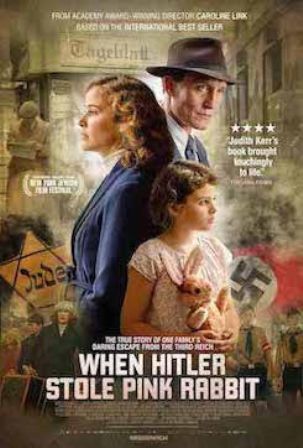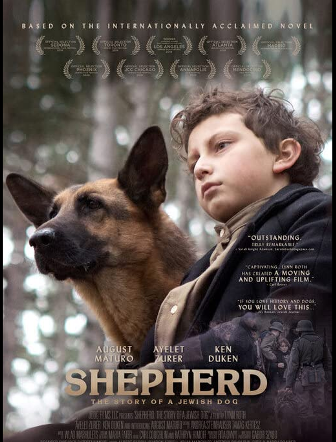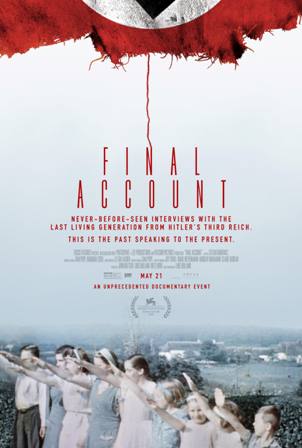Maven's Nest
Reel Life: Flick Pix



Three films, from memoir to fiction to documentary, focus on nine-year-old Germans in 1933 whose fates are suspensefully revealed.
By Nora Lee Mandel
WHEN HITLER STOLE PINK RABBIT (ALS HITLER DAS ROSA KANINCHEN STAHL)
Directed by Caroline Link
Written by Caroline Link and Anna Brüggemann, based on the autobiographical novel by Judith Kerr
Produced by Jochen Laube and Fabian Maubach
Germany/Switzerland. 119 min. Not Rated
In German, Swiss German, and French with English subtitles
With: Riva Krymalowski, Oliver Masucci, Carla Juri, Marinus Hohmann, Ursula Werner, Justus von Dohnányi, Rahel Hubacher, and Peter Bantli
Released by Greenwich Entertainment on May 21, 2021
At 2020 New York Jewish Film Festival of Film at Lincoln Center/ The Jewish Museum
SHEPHERD: THE STORY OF A JEWISH DOG
Written and Directed by Lynn Roth, based on the novel The Jewish Dog by Asher Kravitz
Produced by Lynn Roth, Howard Rosenman, J. Todd Harris, and Craig Berenson
USA/Hungary. In English. 94 min. Not Rated
With: August Maturo, Ken Duken, Ádám Pirogi, Viktória Stefanovszky, Miklós Kapácsy, and Gábor Nagypál
Released by JDog Films on May 28, 2021
FINAL ACCOUNT
Directed by Luke Holland
Produced by John Battsek, Luke Holland, and Riete Oord
UK/USA. 94 min. PG-13
In German with English subtitles
Released by Focus Features on May 21, 2021 in theaters
Three films released this month in the U.S. illustrate the parallel lives of nine-year-old Germans in 1933. Their paths as refugee, prisoner, or perpetrator illuminate the impact of the rise of anti-Semitic fascism, historically and presciently for today. Judith Kerr relived her own forced peripatetic youth for her son through an alter-ego in When Hitler Stole Pink Rabbit that is faithfully brought to the screen for younger generations, with empathy for Europe’s politically storm tossed children. The novel basis for Shepherd: The Story Of A Jewish Dog is a clever allegory for when people are treated like animals, and the film adaptation is thrilling when we follow the faithful dog’s journey, even more than the precocious boy. The elderly interviewed in the documentary Final Account were the children who bullied and persecuted these Jews, and grew up to imprison and murder them, or ignore and disregard their plight.
While a translation of Kerr’s 1971 autobiographical novel is required reading in most German schools, I had never heard of the children’s book writer and illustrator until the New York premiere at the 2020 New York Jewish Film Festival, followed by the animated adaptation of her delightful 1968 The Tiger Who Came to Tea that brightened the 2020 Tribeca Film Festival.
In the realistic film, Kerr becomes Anna Kemper, portrayed by charming Riva Krymalowski who attended the same school young Judith did in Berlin. Her creative family are anti-Nazi intellectuals; like Kerr’s, her father Arthur (Oliver Masucci) is a prominent theater critic, and her mother Dorothea (Carla Juri) is a pianist. Her father was so outspoken in newspapers and on radio during the election that he had a surprising fan: a telephone caller from the police warns him that his name is on a list of whose passports will be confiscated if Hitler wins the upcoming election. Already out of sight with the flu, he takes the notice seriously and flees to Prague. Confused enough that they’re Socialist, Jewish, and celebrate Christmas as a German holiday, Anna and older brother Max (Marinus Hohmann) have to keep this first of many difficult secrets, especially from school mates proud to wear their Hitler Youth uniforms to the school carnival.
Their zoologist “Uncle Julius” (Justus von Dohnányi), who thinks he’s safe because only his grandmother was Jewish, brings toy animals and news. With Hitler gaining more power, their father already can’t publish in Prague, and warns the whole family’s passports also could be taken, so meet him in Switzerland ASAP. To keep their cover story of just visiting grandparents in the country, they can only take one suitcase each – what toys, games, and books to pack? What a difficult decision for kids! The new woolly dog or the old pink rabbit? Color pencils or a board game? (A poignant way to bring the emotional difficulty of becoming an exile to a child’s level.) Their housekeeper Heimpi (Ursula Werner) has a solution: put some in another suitcase and she’ll bring it soon.
After tense moments at railroad border crossings, they arrive in Heidi country, staying at the Zwirn family’s Swiss family inn. Though an American audience can’t discern how the siblings’ German is so different from the mocking students at their new school, they also have to adapt to rural food and a more conservative community, where girls aren’t supposed to do cartwheels at recess. (Another child’s eye view of abrupt cultural adaptation.) Anna makes a calendar counting the days until they return home – but Heimpi lets them know that all their possessions have been confiscated, including the extra suitcase. The children imagine that Hitler took their toys, including the old pink rabbit Anna misses. No wonder all of Anna’s lively drawings are of disasters.
In so many Holocaust movies (and this film was supported by the Conference on Jewish Material Claims Against Germany), Switzerland is the goal. But its neutrality didn’t extend refuge to the outspoken, and the frustrated father moves the family again, to Paris where he hopes to write for small Jewish publications. Then they have to adjust to poverty. Her father dodges the anti-Semitic, rent-collecting concierge they dub Madame Prune (Anne Bennent); her mother learns to cook, somewhat. She finds a public girls school for Anna, who learns French despite boring, rote classes – before she is again uprooted.
Kerr wrote further in the 1970s of “Anna” growing up in London during the rest of the war (Bombs on Aunt Dainty) and the post-war years (A Small Person Far Away). Though she actively consulted on the screenplay, Kerr died before the film was completed, two years ago at age 95. German co-writer/director Caroline Link is known here for her Oscar-winning film Nowhere in Africa (Nirgendwo in Afrika) (2001), also based on an autobiographically inspired novel of a German refugee family. She’s welcome to continue to apply her sensitive, child-appropriate touch to Anna’s further experiences as an émigré.
The fictional family who births and blesses Shepherd: The Story Of A Jewish Dog is still in Germany in 1935 as the Nuremberg Laws go into effect. “No Jews Allowed” is added to the park sign “No Dogs Allowed”; the nine-year-old boy Joshua (August Maturo) and sister Rachel (Viktória Stefanovszky) are dismissed from school; his father Samuel (Hungarian actor Ádám Pirogi) loses his job, and his mother Shoshona (Israeli actress Ayelet Zurer) is excluded from grocery shops. When Jews are no longer permitted to own pets, their German Shepherd puppies are scorned because they are not pure-bred. Shoshona notes wryly: “We are no longer the right breed of Germans.” They also have a housekeeper, who is informed that an Aryan is not permitted to work for Jews, though she returns to adopt a dog.
As the plot follows the structure of the classic horse story Black Beauty, the book, by an Israeli, more emphasized both satire and religion. The family named their favorite puppy Caleb, but his next owner Frank Heinz (Hungarian actor Miklós Kapácsy) prefers “Wilhelm”. His mean wife Greta (American actress Lois Robbins) rejects the dog under any name; in the book she is much more of a Nazi, even turning in her husband. Caleb escapes to go home – but his Jewish family is gone. Dreaming of his happy puppyhood with Joshua (these black-and-white peeks into the dog’s mind are touching), he becomes a homeless street dog. The feral dog pack interactions are filmed almost as effectively as Kornél Mundruczó’s all-dog White God (2015). Caleb passes by symbols of what is happening to the Jews, like cattle cars left on sidings. He is so hungry he can’t resist the meat temptations of the dog catchers.
At the pound, Caleb faces a “selection” by an infamous doctor (a la Mengele) who similarly designates each dog’s fate by pointing right or left. Most of the dogs are loaded into special trucks. (More extermination symbolism.) Caleb, instead, is picked out by Ralph Schmidt (German actor Ken Duken) who cleans him up into “Blitz” and turns out to be a really nice SS dog trainer. (He wants to study theology after the war and doesn’t want Blitz in on the Ukrainian guards’ profitable dog fights.) In a group class, the dog is trained to obediently chase people with yellow stars, hunt them down, bite and drag their bodies. Ralph teaches him a new trick in exchange for a treat– hold up his paw in a “Heil Hitler” salute that the commander appreciates. (“Uncle Julius” in the other film described a Jewish colleague treated the same way.)
Ralph and Blitz are rewarded with assignment to Treblinka concentration camp. The story moves more into the strained fable territory of Mark Herman’s The Boy in the Striped Pajamas (2015) when Joshua and his Caleb reunite. The boy aggressively convinces Ralph to let him stay in the kennel to care for the dogs, and their lucky examples of survival strategies continue through as the boy and his dog even join up with partisans fighters in southern forests. Writer/director Lynn Roth's The Little Traitor (2007) also intersected a fictional child with realistic Jewish history without quite such heroic elements.
As they turned 10-years-old in the 1930s, the two dozen or so real-life former SS officers interviewed in Final Account eagerly joined “Deutsches Jungvolk” (for boys) and “Jungmädelbund” (for girls), even before Hitler Youth participation was mandatory. One woman shrugs: “You want to be in a group, you want to be out of the house.” While the Jewish kids in the other films were being banned from parks and sports (and then forced out of their houses), these Germans fondly remember how they got to swim in pools, run on fields, dance on lawns, and play instruments in parades. And to start public Jew-baiting.
In the first third of this fascinating documentary, they are nice-seeming old folks, as they trace their recruitment and enlistment into the SS. Director Luke Holland spent over a decade tracking down former SS officers mostly in Germany and Austria, as well as concentration camp workers, secretaries, and nearby residents, conducting 250 interviews for over 500 hours. While about 900,000 Germans served in the SS and another 900,000 manual laborers worked just on the railroad system that transported men, women and children to the numerous camps, finding them was unusual enough, as long as no criminal ramifications were involved.
Holland’s achievement is unique. Lukáš Přibyl for his extraordinary quartet Forgotten Transports [(To Latvia (2007), To Estonia (2008), To Belarus (2008), and To Poland (2010)] utilized the clear memories of Czech survivors for leading details of their SS jailers (such as nicknames, regional accents, physical distinctions) to determinedly locate them or their relatives for corroborating identification documentation, by agreeing to no interviews. Claude Lanzmann for Shoah (1985) and Thomas Harlan for Wundkanal/Our Nazi (1984) had to secretly manipulate the SS officers they filmed. How Holland figured he got willing participation to go on camera these decades later: “I often felt there was a sense in which the people I talked with wanted to unburden themselves to me…They and their peers were so close to their demise.” Holland himself died of cancer two months before his film’s premiere.
In addition to opening up their lives and memories they had never before admitted, the interviewees open up their personal scrapbooks, photographs, and memorabilia from the elite institution that they were then (and some still) proud had selected them. Holland adds in previously unseen archival material, including footage of those happy junior Hitler Youth activities. Quiet moments of reflection at the memorials for the infamous events and at notorious sites accompany the witness descriptions in the second part of the film: in Germany: SS Officers Training School at Dachau, Nazi Political Academy (NAPOLA) boarding schools, Kristallnacht, Bernburg Extermination Center, Sachsenhausen, the Valentin U-Boat Bunker, Bergen-Belsen; in Austria - Mauthausen and Ebensee; and in the Pripet Marshes on the Belarus/Ukraine border. In general, the SS members don’t include their own actions, even when Holland nudges one: ‘You were a camp guard!”
Holland pushes further on complicity in the final, spell-binding section, In one long, veritè sequence in Berlin’s Wannsee Villa, where Nazi bureaucrats arranged The Final Solution in 1942, former SS member Hans Werk viscerally reacts to a group of young adults having varied and even chilling responses to his regrets for serving at the Buchenwald concentration camp. But other former officers also evince a range of considerations about the Nazi agenda and their own responsibilities from within the belly of the beast. The USC Shoah Foundation will be utilizing the documentary in its educational programs, while it’s not clear where the comprehensive archive of Holland’s filmed interviews will be housed.
These three absorbing films well demonstrate to today’s children why after the Holocaust, European Jews cynically described the 1930s: “The pessimists went to New York. The optimists went to Auschwitz.”
When Hitler Stole Pink Rabbit (Als Hitler Das Rosa Kaninchen Stahl) is appropriate for children who can read subtitles.
Shepherd: The Story Of A Jewish Dog is appropriate for children who can understand the concept of a fictional allegory.
Final Account is appropriate for children who have some knowledge of the Holocaust, which is discussed but not shown, and can understand the concept of complicity.
5/18/2021
Nora Lee Mandel is a member of New York Film Critics Online. Her reviews are counted in the Rotten Tomatoes TomatoMeter:
 Complete Index to Nora Lee Mandel's Movie Reviews
Complete Index to Nora Lee Mandel's Movie Reviews
My reviews have appeared on: Film-Forward; FF2 Media; Lilith, FilmFestivalTraveler; and, Alliance of Women Film Journalists and for Jewish film festivals. Shorter versions of my older reviews are at IMDb's comments, where non-English-language films are listed by their native titles.
Recommended Films at Mandel Maven's Nest Reel Life: Flick Pix
Copyright © 2021




